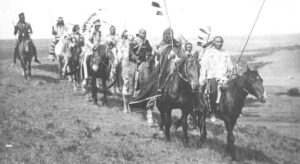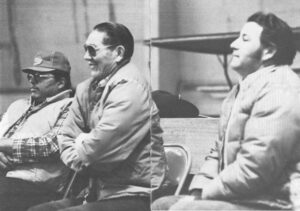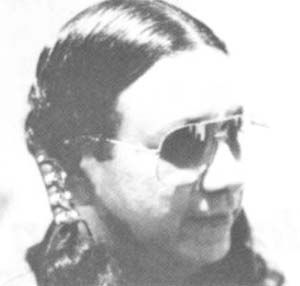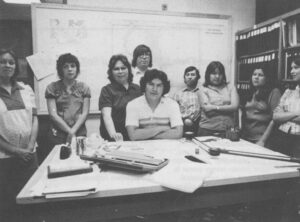Marjane Ambler
- 1980

Fellowship Title:
- Indian Engergy Policies and Their Effect on Tribal Self-sufficiency
Fellowship Year:
- 1980

The Thicket of Tribal Law
LAME DEER, Mont.–As energy development accelerates in the West, trouble comes with it. Ranchers object when a state legislature decides to allocate thousands of acre-feet of water to a coal slurry pipeline. Homeowners protest when their wells go dry after a strip mine is dug. And when power companies try to condemn prime farm land for a transmission line, farmers holler. Among the most affected groups are American Indians whose reservations sit on some of the largest and most coveted reserves of coal, uranium and oil shale in the West. Resolving conflicts over energy development between tribal administrations and individual tribal members is a special matter, however, because of profound differences between the American legal system and ancient Indian traditions. The United States has a 200 year history of laws, legal precedents and administrative procedures that determine a frame work for settling such disputes. On the other hand, many tribal governments are still in limbo between their old ways-unwritten codes of behavior and decisions by consensus-and the new. They are still writing laws and just

Making Peace Between Tribes and Energy Lords
(LANDER, WY) — After several months of negotiation, Tesoro Petroleum reluctantly agreed to most of the Blackfeet Tribe’s demands for financial return and tribal control over oil development. While Tesoro officials knew they risked the wrath of other companies for setting such a precedent, they wanted Blackfeet oil and also hoped to establish a reputation that would open other Indian resources to them. But the deal was never consummated. A week before it was to be signed, the Bureau of Indian Affairs announced an oil sale for nearby Indian lands with none of the tough conditions the tribe was demanding. Tesoro, infuriated, withdrew its offer to the tribe. Frustrating? Confusing? Yes, but according to energy executives interviewed recently on Indian energy development, that’s nothing. They launch into litanies of other obstructions to Indian energy development – tribal members challenging their tribal councils’ decisions in court; the BIA forbidding tribes to negotiate contracts; tribes and states fighting over which can tax minerals; sit-ins; takeovers and threats of expropriation. How such problems will be solved will, for

Uncertainty In CERT
LANDER, Wyo.–Five years ago the 25 major energy tribes of the West created the Council of Energy Resource Tribes. With a bravado that soon backfired, the organization compared itself with OPEC, reporting that the tribes owned one-third of the West’s low sulfur coal; one-half of the nation’s privately-owned uranium; and huge reserves of oil, gas and oil shale. What the tribes really wanted was not cartel powers but equitable financial return and the opportunity to develop or not to develop according to their people’s goals. Besieged daily with development proposals, they lacked the expertise to evaluate them and they lacked confidence in the federal government’s advice, which had betrayed them in the past. No one ever thought it would be easy to bring together two dozen tribes, who are traditionally wary of each other, of energy corporations, and of the federal government. Nor would it be easy to get federal funding and plunge into tribal development choices involving billions of dollars. Now, five years later, most tribe members are proud of CERT’s performance, saying the

Tribal Control
Lorem ipsum dolor sit (NEW TOWN, N.D.) — When oil prices skyrocketed recently and exploration crews began arriving on the Fort Berthold Reservation in North Dakota, the activity was a mixed blessing to the Three Affiliated Tribes (Arikara, Hidatsa and Mandan). With 40 percent unemployment and few sources of income other than tribal or federal jobs, many tribal members looked forward to the increase in jobs and royalties. However, the companies left dynamite lying around, cut fences and disrupted the lives of the people. “They were running rampant over the reservation,” according to the local Bureau of Indian Affairs superintendent, Harrison Fields (Pawnee), whose job it is to protect the land from such things. When the BIA didn’t respond to their complaints, some landowners resorted to guns to protect their land and livestock. The tribes, frustrated by the BIA’s lack of control, adopted their own seismic exploration regulations, issued permits and hired Indian guides (paid by the company) who accompanied each exploration crew to make sure that the companies followed the regulations. While public attention

Uranium Mill Workers Seek Compensation
(SHIPROCK, NM) — Grace Begay can’t leave her husband, Steven, 64, alone. She follows him around the house, afraid that he’ll black out again with no one there to help him. As he sits patiently describing his symptoms in Navajo through an interpreter, he holds his arms crossed to still the otherwise constant tremor in his hands. He has seen eight doctors in the past 17 years, none of whom can figure out what’s wrong with him. For 10 years Wallace Martin, also a Navajo, has known there is something wrong with his lung. When he tries to walk faster, he has trouble breathing. Doctors kept telling him there was nothing wrong with him until finally they saw the evidence of silicosis in his lung. “That uranium got me,” he says. Henry C. Bearing, an Arapahoe Indian in Ethete, Wyoming, also has trouble breathing sometimes and says he has felt “lazy” and lethargic for several years. Most of Bob Haddenham’s hair has grown back, and he no longer blacks out in the middle of sentences,
